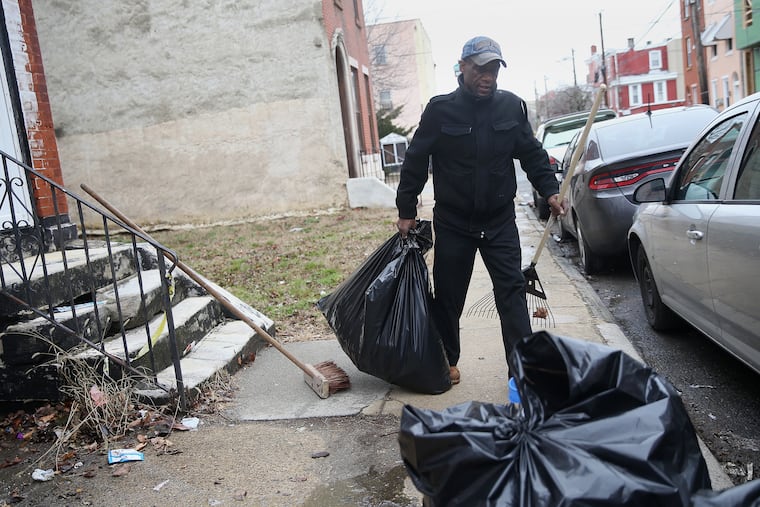Street sweeping pilot program to launch this spring
Street sweeping is returning to Philadelphia in the form of a limited pilot program this spring.

Philadelphia’s slovenly rep as one of the only big cities without residential street sweeping could soon be tidied up.
City officials announced Wednesday that a pilot cleaning program will begin this spring.
“Street sweeping is not the silver bullet that’s going to clean everything up,” said Nic Esposito, head of the city’s Zero Waste and Litter cabinet. “We knew it was something cities do that we’ve done to varying degrees in the city before, it’s just that larger issues like illegal dumping, better regulation of waste management ... is something we had to get a handle on first.”
Esposito, who first announced the pilot on WHYY’s Radio Times, said the city has not chosen the inaugural neighborhoods but would use its litter index to inform the selection process. The survey ranks the city’s litter situation block by block. Some of the most littered areas, according to the index, are in North Central Philadelphia and Kensington.
While most big cities have a residential sweeping program, they vary in scope and frequency.
“I want people to break away from the thinking that ‘comprehensive citywide street sweeping’ means every neighborhood in every other city is getting once-a-week sweeping," Esposito said. "We want to make it as equitable as possible and as efficient as possible.”
The pilot is one of several initiatives Esposito’s office has launched in recent months, including giving a trash can to every rowhouse in an area of North Philadelphia, cracking down on illegal dumping, and surveying the city to determine which blocks have the most trash.
Bringing back weekly citywide street sweeping would cost $5.2 million annually and require a one-time $12 million purchase of equipment, the Streets Department told the Inquirer in February. The department’s 2017 budget was $98.9 million.
The city does sweep some major corridors, but Mayor Kenney has suggested the issue with a larger-scale residential sweeping program is more political than financial. He’s often cited how former Councilman Frank DiCicco’s resurrection of street sweeping was met with loud complaints from neighbors having to move their cars in tight pockets of South Philadelphia.
Kenney has received some criticism for leaning on the “neighbors don’t want to move their cars” excuse in a city that has long struggled with trash and litter problems, earning the nickname Filthadelphia.
An Inquirer article last year found that the litter problem is especially bad in lower-income neighborhoods, where the city can be slow to respond to a high number of complaints.
When the city polled 7,000 residents last year and asked what issue mattered most to them, streets and sanitation topped the list.
Citywide, Philadelphia has 6,500 block captains, who volunteer to clean their own blocks. But only a quarter of blocks in Philadelphia have a captain, and the city keeps their names private, making it difficult to determine who is in charge.
That has left some civic groups pooling money to pay for street-cleaning services or taking care of the mess themselves.
West Philly resident Dave Brindley created Not in Philly, which allows people to claim a block to clean up via an interactive map. He’s got 1,300 people signed up to clean streets across the city. About 10 percent of the volunteers, he notes, are in South Philadelphia.
“There’s a strong hatred of litter even in South Philly,” he said. “Litter is something that all Philadelphians hate seeing, and I don’t know why there is such a mystical belief that drivers in Philadelphia will never move their cars. Every other city does this.”
But Esposito said parking can’t be discounted either. “Parking is an issue. It is something we are going to have to consider as we do this. Because not everyone is on the side of ‘Just run the sweepers now, we don’t care.’”